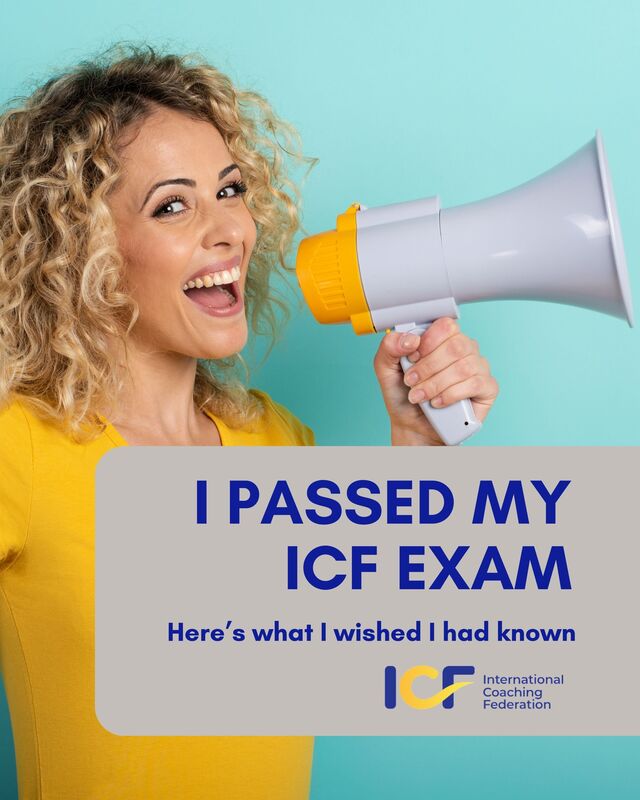- Home
-
Qualifications
- Diploma in Nutrition and Health Coaching
- Womens Health and Wellness Coach Certification
- Certified Coaching Professional Program
- Diploma in Coaching for Lifestyle & Wellbeing Management
- Holistic Wellness Coaching Program
- The Ultimate Triple Qualification
- Health Coaching Electives
- Wellness Coaching for Professionals
- Coach Gap Training
- Professional Certificate in Meal and Menu Planning
- Accreditation, Registration & Insurance Options
- Degree & Diplomas
- Short Courses
- Testimonials
- Enrol
- FAQs
- About
- Contact
- Login
- Things We Do
|
From ICF certified Coach, Sarah Taylor Well folks, yesterday I passed my ICF credentialing exam. So I’m now a certified ACC coach with the gold-standard of coaching institutes - wooop wooop! It's funny, as I'm not sharing this on social media. Why? Because in all truthfulness, I'm a little embarrassed….that after being in the business of coaching since 2015, I'm only just now able to say I’m ICF certified. (Back story: my starting point as a coach was as part of my employer’s internal coaching bank. Their training programme was part of the UK’s Association For Coaching, so it made sense to go on and gain my accreditation with them. They're a fab organisation and I’m now an assessor for them. But the truth is, a lot of companies now ask for ICF credentials). How I Prepared For The ExamWell, I googled “how to best prepare for the ICF exam” - duh! But I was surprised with how little information there was out there. Maybe as it’s a relatively new part of the credentialing process. Maybe because the ICF get you to e-sign a non-disclosure form before taking the exam ha ha ;-) The best point of information is probably just the ICF itself. They tell you that it’s scenario based and designed to test your understanding of their ethical guidelines and updated core competencies. There is no need to learn these verbatim, it’s not that kind of test. Chances are, if you’ve got as far as taking the exam, you’ll already be very familiar with these anyway. The trick is, understanding how to apply them in context! To help prepare, I immersed myself in reading coaching books. Good ones. The Co-Active Coaching book is an obvious starting point. But I also reeeeally love Simplifying Coaching by Claire Pedrick: What Was The Exam Like?I’m 40 years old. Despite being a lifelong lover of learning and personal development, I’ve not sat an actual exam since my school days (my degree and postgraduate studies have all been essay based). Honestly? I was surprised with how nervous I felt. I chose to do the exam at home (you can opt to go to a centre if you prefer). That meant I had a virtual proctor observing me the whole time. I had to pick up my laptop so I could use it’s webcam to show him my desk had no cheating aids on it!! Once you’re there, you will be there for the next 2-3 hours (aside from one timed 5 minute break). So, make sure you’re comfy! The time went pretty quickly, but it didn’t take me the full 3 hours. You can flag any questions you’re not sure about to revisit before submitting. At first, I found I was flagging them all! Then I got more into the swing of it and trusted my instinct more. The scenarios are all pretty relatable. So I felt that it was a genuinely useful experience to consider what I would do for each situation. There were SO many questions I felt unsure about, but I don’t think I could have prepared anymore. The only thing I wish, is that they gave feedback on your answers so you can learn from the incorrect ones. Oh well. In ConclusionThe exam really made me think. It reinforces how excellence in coaching is an art more than a science. No matter how well you can talk about the competencies in theory, in reality there are so many situational nuances. I feel grateful and relieved to have passed and even more determined to deeply reflect as I continue to grow in experience as a coach. AuthorDr Sarah Taylor from @thrivewisely. Sarah has a decade of experience as an Organisational Development professional working with hundreds of leaders at all levels – from frontline supervisors to Chief Executives. Sarah complete the Certified Coaching Professional Program with Well College Global.
0 Comments
Leave a Reply. |
AuthorsBev Whyfon; Bev's Healthy Food Archives
July 2024
Categories
All
|
|
CONNECT WITH US
|
- Home
-
Qualifications
- Diploma in Nutrition and Health Coaching
- Womens Health and Wellness Coach Certification
- Certified Coaching Professional Program
- Diploma in Coaching for Lifestyle & Wellbeing Management
- Holistic Wellness Coaching Program
- The Ultimate Triple Qualification
- Health Coaching Electives
- Wellness Coaching for Professionals
- Coach Gap Training
- Professional Certificate in Meal and Menu Planning
- Accreditation, Registration & Insurance Options
- Degree & Diplomas
- Short Courses
- Testimonials
- Enrol
- FAQs
- About
- Contact
- Login
- Things We Do


 RSS Feed
RSS Feed
